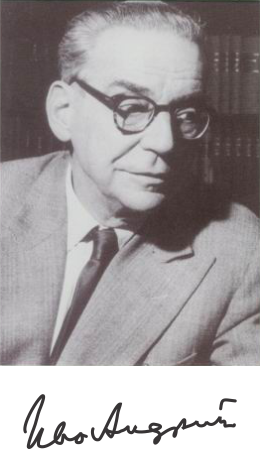 |
Ivo Andric (1892-1975) |
Ivo Andric (Travnik, 9 October 1892 – Belgrade, 13 March 1975) was Bosnian and Herzegovinian writer and a diplomat of the Kingdom of Yugoslavia. He won the Nobel Prize in literature in 1961 for his literary work as a whole about the history of one country, with the „Bridge on the Drina“ novel (1945) as the climax of this work.
He spent his childhood in Višegrad where he completed his elementary school and, in 1903, he enrolled in the Great Grammar School, the oldest Bosnian and Herzegovinian secondary school in Sarajevo. He studied philosophy - Department of Slavic Literature and History in Zagreb, Vienna, Krakow and Graz. His doctoral thesis the Evolution of Spiritual Life in Bosnia under the Influence of the Turkish Rule (Die Entwicklung des geistigen Lebens in Bosnien unter der Einwirgung der turkischen Herrschaft) was defended by Andric at the University of Graz in 1924.
As a diplomat of the Kingdom of Yugoslavia, starting from 1919, he served in Rome, Paris, Madrid, Bucharest, Graz, Brussels, Geneva and Berlin. In 1937, in Poland, he received the Order of the Great Commander of Restored Poland, and in France the Order of the Grand Officer of the Legion of Honour. He quit his career in diplomacy in 1941 and devoted himself entirely to literature.
Andric entered the world of literature with poems published in Sarajevo in 1911, and published his first book of poems in prose Ex Ponto in Zagreb in 1918. His next book of poetry Unrest was printed in Belgrade in 1920. Until the World War II, as an excellent stylist, he mainly wrote novellas and short stories (three books: 1924, 1931 and 1936). In 1945, he published his most important literary works The Bridge on the Drina and The Days of the Consuls. In his works Andric did not embark on the literary experiments that dominated his time, but he shaped instead with his plastic descriptions, in the classical tradition of the 19th century realism, his vision of Bosnia and Herzegovina as a crossroads of the East and the West. In 1961, Andric received a Nobel Prize for his literary work as a whole and the „epic strength with which he shaped the motives and fates from the history of his country“. He donated the entire amount of his cash award to Bosnia and Herzegovina for construction of libraries and purchase of books.
In addition to his works The Bridge on the Drina and the Days of the Consuls, his other most important works include The Woman from Sarajevo (1945), The Damned Yard (1954), Jelena, the Woman of my Dream (1963), and a book of aphoristic notes Signs by the Roadside (1976) published after his death.
The Bridge on the Drina, i.e. the Višegrad Bridge that Andric wrote about in his works, was built from 1571 until 1577, and is under UNESCO's protection since 2008.
 English
English Ћирилица
Ћирилица Latinica
Latinica Deutsch
Deutsch Русский
Русский